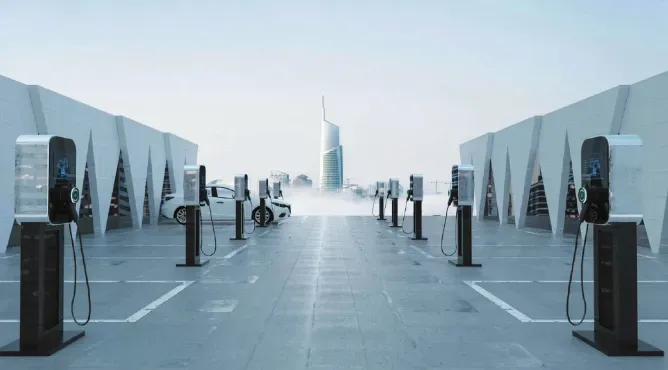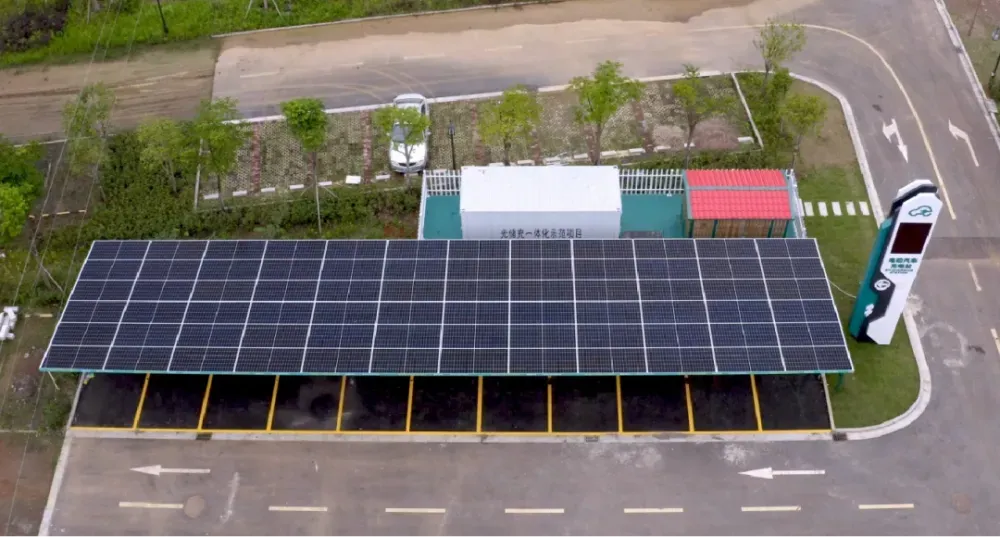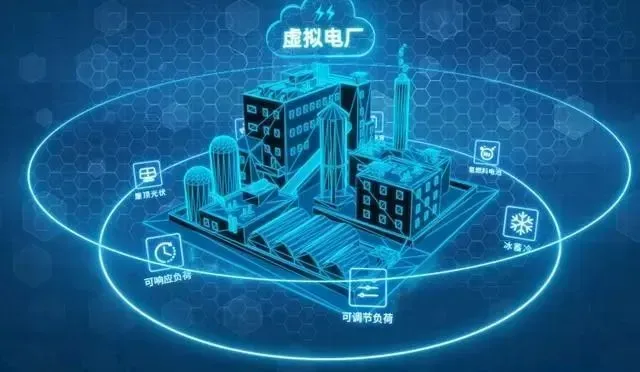Five Major Trends in the Charging Industry
On this page
The electric vehicle (EV) charging industry is undergoing rapid transformation as technological advancements, increasing EV adoption, and a growing emphasis on sustainability drive significant changes. In response to rising demand for faster, more efficient, and environmentally friendly charging solutions, industry leaders are pioneering new strategies and innovations. From the expansion of supercharging networks to the integration of renewable energy storage and vehicle-to-grid technologies, the landscape of EV charging is set to evolve dramatically in the coming years. Below are five major trends that will shape the future of the charging industry.
Companies like Huawei, Telai, and Star Charging are rapidly advancing liquid-cooled supercharging technology, which is becoming a key solution to meet the growing demand for fast charging. As more new energy vehicles equipped with 800V high-voltage platforms enter the market—over 60 models to date—the cost of these vehicles is expected to decrease. Prices could drop below $25,000, encouraging faster consumer adoption of electric vehicles (EVs). This shift will further drive the expansion of supercharging stations across urban areas.
Several cities have proposed plans for the deployment of high-power charging:
Shenzhen plans to establish a globally leading, multi-scenario supercharging infrastructure service system by the end of 2024, aiming to build the "Shenzhen Supercharging" brand. Guangzhou is also launching its "Supercharging Capital" initiative, which explicitly supports super high-power fast-charging technology and focuses on building a multi-level, multi-type, and multi-scenario charging network. Hainan has initiated its "Supercharging Island" project, aiming to build over 400 supercharging stations by 2025. Meanwhile, Beijing has introduced subsidies for high-power charging equipment.
 Charging stations that integrate "solar, storage, and charging" technologies are set to become widespread. These stations combine photovoltaic charging, energy storage, and battery diagnostics, allowing efficient EV charging with renewable energy sources. By leveraging energy storage during off-peak hours and using low-cost electricity during peak periods, these stations promote low-carbon solutions and enhance energy efficiency. This integrated model is expected to play a pivotal role in the future of charging infrastructure development.
Charging stations that integrate "solar, storage, and charging" technologies are set to become widespread. These stations combine photovoltaic charging, energy storage, and battery diagnostics, allowing efficient EV charging with renewable energy sources. By leveraging energy storage during off-peak hours and using low-cost electricity during peak periods, these stations promote low-carbon solutions and enhance energy efficiency. This integrated model is expected to play a pivotal role in the future of charging infrastructure development.
 While rural areas face sparse charging infrastructure, urban communities continue to struggle with limited parking and charging options. Insufficient power capacity and difficulties in expanding infrastructure remain challenges. To address these issues, unified systems for constructing, operating, and maintaining EV charging facilities are being introduced. These intelligent charging solutions will likely expand after 2024, providing more organized and accessible charging options for urban residents.
Energy companies, with their strategic locations and operational expertise, are set to intensify competition in the charging industry. From 2024 onwards, we can expect a surge in the development of integrated energy stations. These facilities will combine refueling, EV charging, hydrogen fueling, and battery swapping services, transforming traditional gas stations into comprehensive energy hubs that cater to diverse transportation needs.
As the EV market expands, so does the need for a robust and versatile charging infrastructure. Alongside this growth, there will be increased exploration into energy storage solutions and vehicle-to-grid (V2G) technologies. These innovations will allow EVs to interact with the grid, contributing to energy management and enhancing the overall efficiency of the charging network. Continuous advancements and investments in these areas will drive the evolution of the charging industry, supporting a more sustainable and resilient energy ecosystem.
While rural areas face sparse charging infrastructure, urban communities continue to struggle with limited parking and charging options. Insufficient power capacity and difficulties in expanding infrastructure remain challenges. To address these issues, unified systems for constructing, operating, and maintaining EV charging facilities are being introduced. These intelligent charging solutions will likely expand after 2024, providing more organized and accessible charging options for urban residents.
Energy companies, with their strategic locations and operational expertise, are set to intensify competition in the charging industry. From 2024 onwards, we can expect a surge in the development of integrated energy stations. These facilities will combine refueling, EV charging, hydrogen fueling, and battery swapping services, transforming traditional gas stations into comprehensive energy hubs that cater to diverse transportation needs.
As the EV market expands, so does the need for a robust and versatile charging infrastructure. Alongside this growth, there will be increased exploration into energy storage solutions and vehicle-to-grid (V2G) technologies. These innovations will allow EVs to interact with the grid, contributing to energy management and enhancing the overall efficiency of the charging network. Continuous advancements and investments in these areas will drive the evolution of the charging industry, supporting a more sustainable and resilient energy ecosystem.
 The charging industry is rapidly evolving as cities and companies embrace cutting-edge technologies to meet the growing demand for electric vehicles. From supercharging infrastructure to integrated energy stations and advancements in energy storage, these trends will shape the future of transportation. As the industry continues to innovate, the development of smarter, faster, and more sustainable charging solutions will play a crucial role in accelerating EV adoption worldwide. By staying ahead of these trends, the charging industry is paving the way for a greener, more connected future.
The charging industry is rapidly evolving as cities and companies embrace cutting-edge technologies to meet the growing demand for electric vehicles. From supercharging infrastructure to integrated energy stations and advancements in energy storage, these trends will shape the future of transportation. As the industry continues to innovate, the development of smarter, faster, and more sustainable charging solutions will play a crucial role in accelerating EV adoption worldwide. By staying ahead of these trends, the charging industry is paving the way for a greener, more connected future.
Several cities have proposed plans for the deployment of high-power charging:
Shenzhen plans to establish a globally leading, multi-scenario supercharging infrastructure service system by the end of 2024, aiming to build the "Shenzhen Supercharging" brand. Guangzhou is also launching its "Supercharging Capital" initiative, which explicitly supports super high-power fast-charging technology and focuses on building a multi-level, multi-type, and multi-scenario charging network. Hainan has initiated its "Supercharging Island" project, aiming to build over 400 supercharging stations by 2025. Meanwhile, Beijing has introduced subsidies for high-power charging equipment.
 Charging stations that integrate "solar, storage, and charging" technologies are set to become widespread. These stations combine photovoltaic charging, energy storage, and battery diagnostics, allowing efficient EV charging with renewable energy sources. By leveraging energy storage during off-peak hours and using low-cost electricity during peak periods, these stations promote low-carbon solutions and enhance energy efficiency. This integrated model is expected to play a pivotal role in the future of charging infrastructure development.
Charging stations that integrate "solar, storage, and charging" technologies are set to become widespread. These stations combine photovoltaic charging, energy storage, and battery diagnostics, allowing efficient EV charging with renewable energy sources. By leveraging energy storage during off-peak hours and using low-cost electricity during peak periods, these stations promote low-carbon solutions and enhance energy efficiency. This integrated model is expected to play a pivotal role in the future of charging infrastructure development. While rural areas face sparse charging infrastructure, urban communities continue to struggle with limited parking and charging options. Insufficient power capacity and difficulties in expanding infrastructure remain challenges. To address these issues, unified systems for constructing, operating, and maintaining EV charging facilities are being introduced. These intelligent charging solutions will likely expand after 2024, providing more organized and accessible charging options for urban residents.
Energy companies, with their strategic locations and operational expertise, are set to intensify competition in the charging industry. From 2024 onwards, we can expect a surge in the development of integrated energy stations. These facilities will combine refueling, EV charging, hydrogen fueling, and battery swapping services, transforming traditional gas stations into comprehensive energy hubs that cater to diverse transportation needs.
As the EV market expands, so does the need for a robust and versatile charging infrastructure. Alongside this growth, there will be increased exploration into energy storage solutions and vehicle-to-grid (V2G) technologies. These innovations will allow EVs to interact with the grid, contributing to energy management and enhancing the overall efficiency of the charging network. Continuous advancements and investments in these areas will drive the evolution of the charging industry, supporting a more sustainable and resilient energy ecosystem.
While rural areas face sparse charging infrastructure, urban communities continue to struggle with limited parking and charging options. Insufficient power capacity and difficulties in expanding infrastructure remain challenges. To address these issues, unified systems for constructing, operating, and maintaining EV charging facilities are being introduced. These intelligent charging solutions will likely expand after 2024, providing more organized and accessible charging options for urban residents.
Energy companies, with their strategic locations and operational expertise, are set to intensify competition in the charging industry. From 2024 onwards, we can expect a surge in the development of integrated energy stations. These facilities will combine refueling, EV charging, hydrogen fueling, and battery swapping services, transforming traditional gas stations into comprehensive energy hubs that cater to diverse transportation needs.
As the EV market expands, so does the need for a robust and versatile charging infrastructure. Alongside this growth, there will be increased exploration into energy storage solutions and vehicle-to-grid (V2G) technologies. These innovations will allow EVs to interact with the grid, contributing to energy management and enhancing the overall efficiency of the charging network. Continuous advancements and investments in these areas will drive the evolution of the charging industry, supporting a more sustainable and resilient energy ecosystem. The charging industry is rapidly evolving as cities and companies embrace cutting-edge technologies to meet the growing demand for electric vehicles. From supercharging infrastructure to integrated energy stations and advancements in energy storage, these trends will shape the future of transportation. As the industry continues to innovate, the development of smarter, faster, and more sustainable charging solutions will play a crucial role in accelerating EV adoption worldwide. By staying ahead of these trends, the charging industry is paving the way for a greener, more connected future.
The charging industry is rapidly evolving as cities and companies embrace cutting-edge technologies to meet the growing demand for electric vehicles. From supercharging infrastructure to integrated energy stations and advancements in energy storage, these trends will shape the future of transportation. As the industry continues to innovate, the development of smarter, faster, and more sustainable charging solutions will play a crucial role in accelerating EV adoption worldwide. By staying ahead of these trends, the charging industry is paving the way for a greener, more connected future.